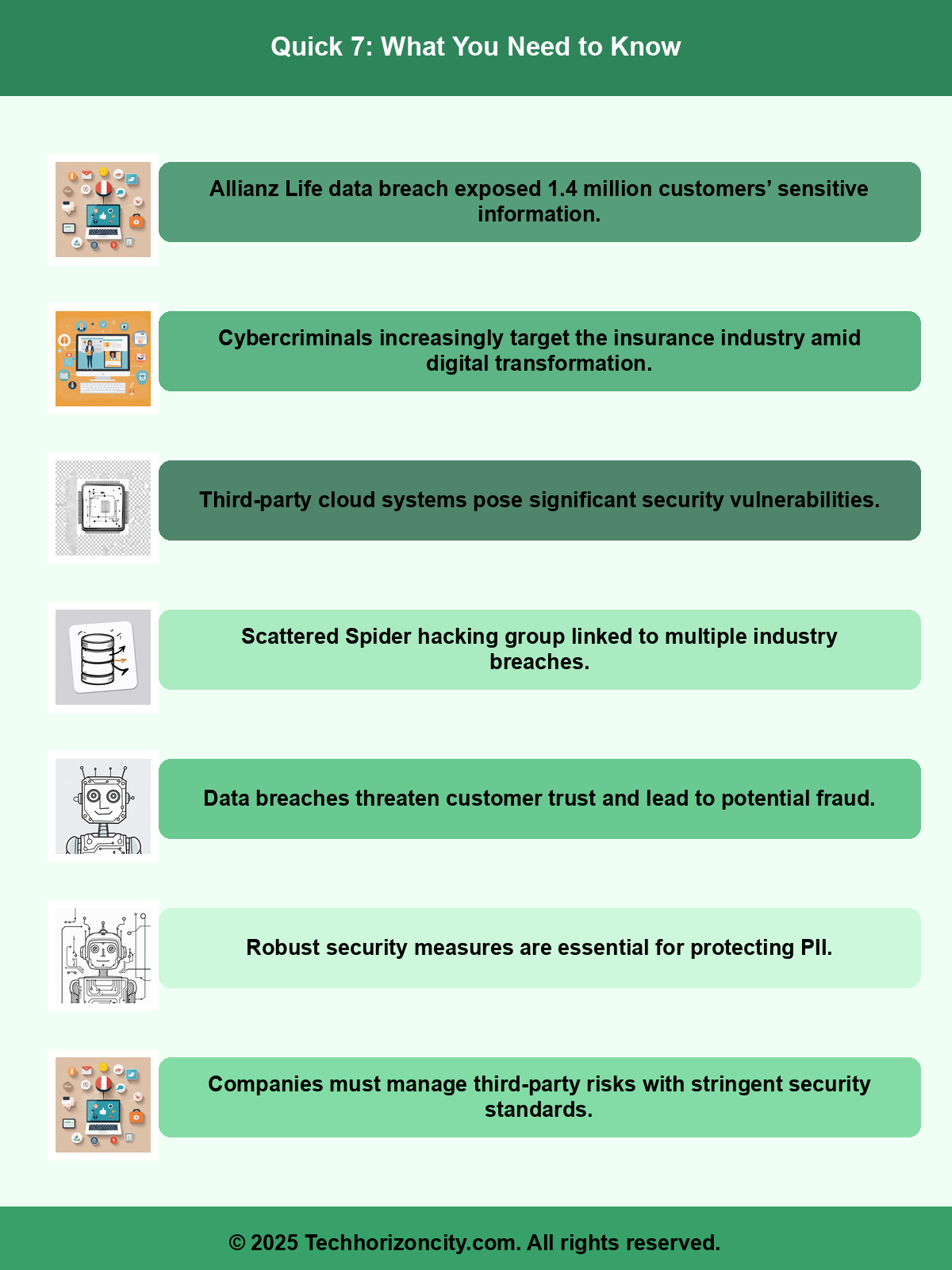Executive Summary
On July 16, 2025, Allianz Life confirmed a significant data breach, revealing vulnerabilities within the insurance industry that have far-reaching implications. The incident, which involved unauthorized access to a third-party cloud-based customer relationship management (CRM) system, compromised sensitive personally identifiable information (PII) of approximately 1.4 million customers, financial professionals, and select employees. This event not only raises questions about cybersecurity practices within Allianz Life but also highlights a perilous trend affecting numerous players in the insurance sector. As companies grapple with increasing cyber threats, the need for robust security measures and proactive communication strategies becomes more urgent than ever.

Background Context
The recent breach at Allianz Life is not an isolated incident. The insurance industry has been increasingly targeted by cybercriminals, with recent attacks also impacting other prominent companies like Aflac. In an era characterized by digital transformation, organizations in this sector are transitioning to online platforms for customer interaction, leading to an increased risk of data exposure. Allianz Life, with its substantial customer base comprising around 1.4 million individuals in the U.S. and backed by its parent company Allianz, which serves over 125 million clients worldwide, underscores the magnitude of the challenge at hand.
For technical resources and innovative solutions, please visit EchoesOfCreationUS for specialized technical resources.
Security researchers have traced a number of these breaches to a hacking group known as Scattered Spider, notorious for its capability to penetrate various sectors, including retail and transportation. The hackers accessed Allianz Life’s systems through a cloud-based CRM, raising concerns about the security protocols employed by third-party service providers and the insurance industry’s overall cybersecurity posture.
Analysis of Implications
The Allianz Life data breach serves as a cautionary tale for the insurance industry, emphasizing the critical need for enhanced data security measures. The exposure of PII not only jeopardizes customer trust but also opens the door to potential identity theft and financial fraud. Customers expect their insurers to protect their sensitive information, and when breaches occur, it can lead to significant reputational damage and loss of business.
Discover exclusive offers and premium content at Active Living Offers – your gateway to enhanced productivity and lifestyle solutions.
Moreover, the incident sheds light on the complexities of managing third-party risk. As companies increasingly rely on external service providers for customer management solutions, they must ensure that these partners adhere to stringent security standards. Failure to do so can lead to unforeseen vulnerabilities that compromise customer data.
Allianz Life’s decision to report the breach to the FBI is prudent, as it underscores the seriousness of the situation and the company’s commitment to transparency. However, the lack of information regarding potential communication from the hackers or specific attribution to a hacking group raises additional questions. This ambiguity can fuel speculation and uncertainty among stakeholders, which is counterproductive in crisis management scenarios.
Industry Impact Assessment
The repercussions of the Allianz Life breach extend beyond the company itself, potentially impacting the entire insurance sector. As customers become increasingly aware of cybersecurity threats, their trust in traditional insurers may wane, leading them to seek alternative providers or financial products that promise better protection against data breaches. This shift could disrupt the competitive landscape, as companies that prioritize cybersecurity may gain a significant edge in customer retention and acquisition.
Furthermore, regulatory scrutiny in the insurance industry may intensify following this incident. Lawmakers and regulatory bodies may push for stricter data protection regulations aimed at safeguarding consumer information. Companies that fail to comply with these regulations could face stiff penalties, further exacerbating the financial implications of a breach. In this context, investment in cybersecurity infrastructure and compliance becomes not just a best practice but a business imperative.
Future Outlook
As we look ahead, the Allianz Life breach is likely to catalyze a shift in how insurers approach data security. Organizations will need to adopt a more comprehensive cybersecurity strategy that encompasses employee training, robust incident response plans, and ongoing risk assessments. Additionally, the integration of advanced technologies, such as artificial intelligence and machine learning, can bolster threat detection and incident response capabilities, enabling insurers to stay one step ahead of cybercriminals.
The insurance industry can also benefit from collaboration, sharing information about threats and vulnerabilities among industry players. Establishing a unified approach to cybersecurity can enhance collective resilience against future attacks. This collaborative spirit could lead to the development of industry-wide standards for data protection, fostering a safer environment for consumers.
Conclusion with Key Takeaways
The data breach at Allianz Life is a stark reminder of the vulnerabilities that lie within the insurance sector. As companies navigate the complexities of digital transformation and the increasing threat of cybercrime, the need for robust security measures and transparent communication with customers is paramount. Key takeaways from this event include:
- Investing in cybersecurity is essential for maintaining customer trust and safeguarding sensitive information.
- The importance of managing third-party risk cannot be overstated; insurers must ensure that partners uphold high security standards.
- Regulatory pressures may increase in response to data breaches, necessitating compliance and proactive risk management strategies.
- Collaboration within the industry can enhance collective defenses against cyber threats.
In conclusion, the Allianz Life data breach not only highlights existing vulnerabilities but also serves as a pivotal moment for the insurance industry to reassess and strengthen its approach to cybersecurity.
Disclaimer: This article was independently created based on publicly available information and industry analysis.
